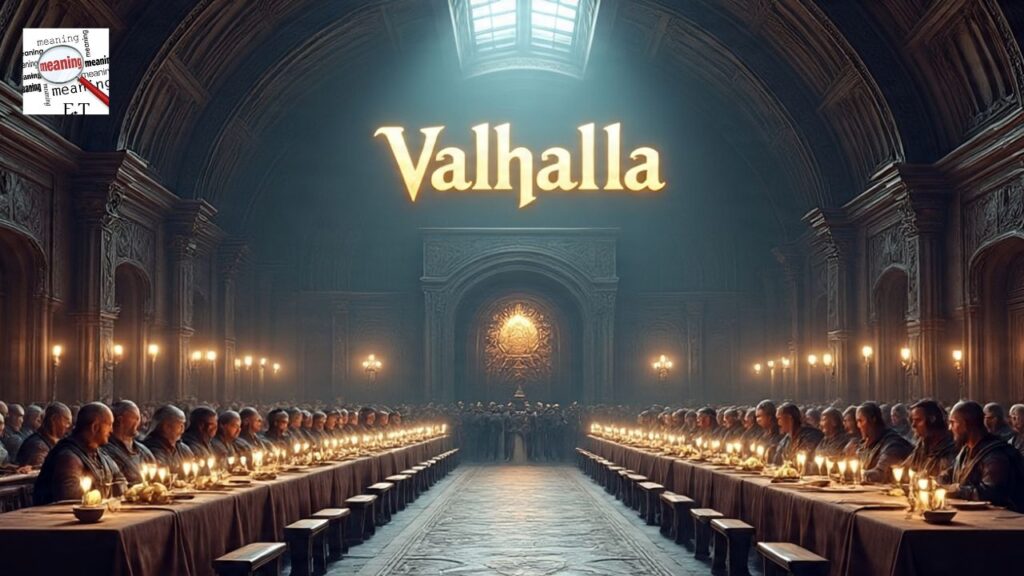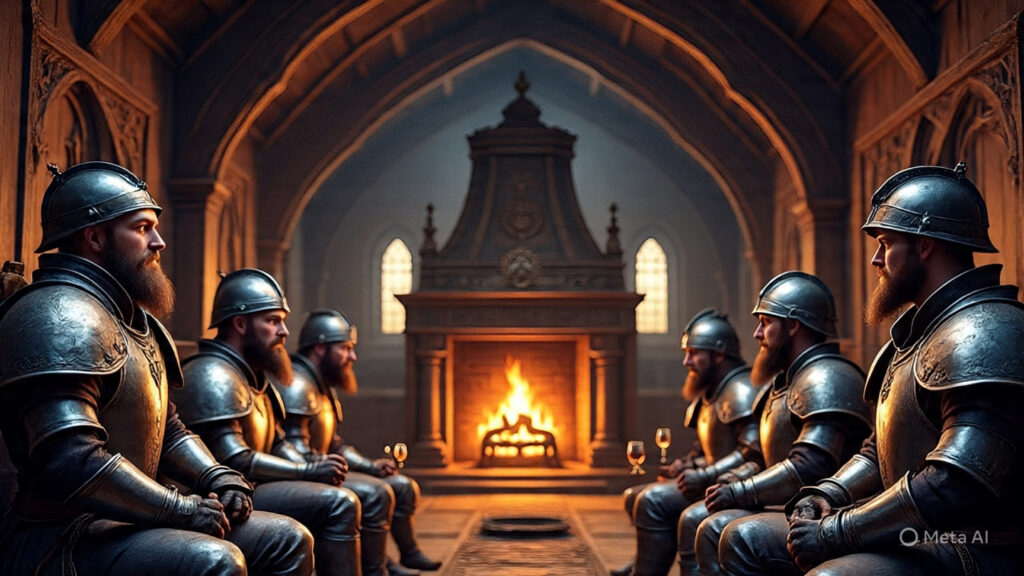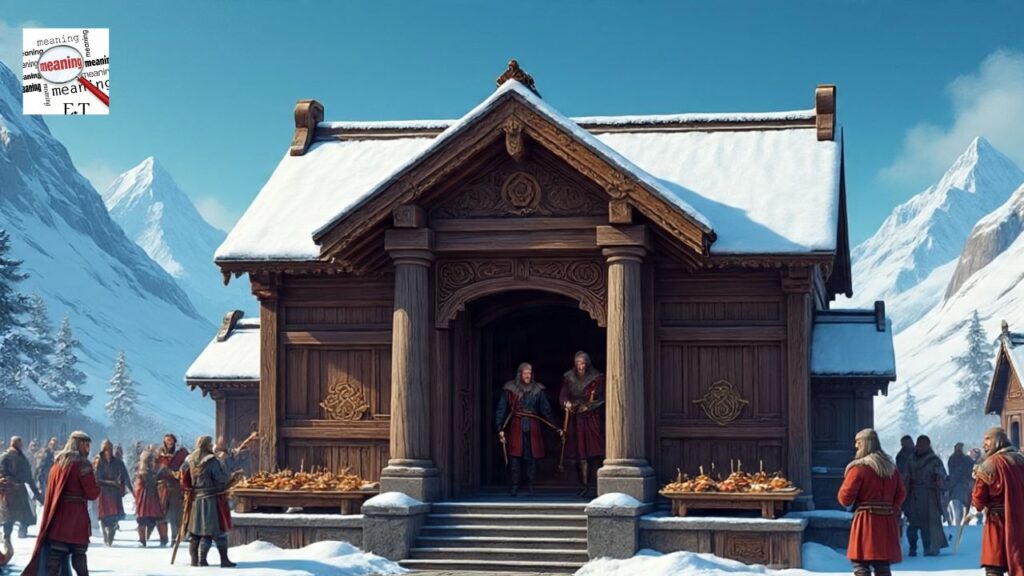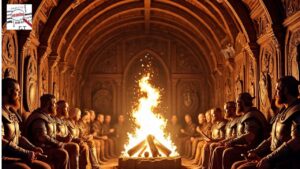Valhalla isn’t just a place, it’s a symbol of bravery, honor, and eternal glory. In Norse mythology, it’s the great hall where warriors who died courageously in battle are welcomed.
There, they feast and celebrate with Odin until the end of time. Simply put, Valhalla represents courage, sacrifice, and being remembered forever.
What is Valhalla?
Valhalla is a legendary hall in Norse mythology where brave warriors who die in battle are believed to go. It is ruled by Odin, the chief of the gods, and is often described as a place of eternal feasts and glory. Valhalla represents honor, bravery, and an everlasting reward for courage.
What does the word Valhalla mean?

The word “Valhalla” translates to “the hall of the slain.” It refers to a majestic place where fallen heroes are gathered after death. The meaning carries a sense of pride, sacrifice, and eternal recognition.
Etymology of Valhalla
The term comes from Old Norse Valhǫll, where valr means “the slain” and hǫll means “hall.” Together, they describe the great hall for fallen warriors. Over centuries, the word evolved into “Valhalla,” keeping its heroic essence intact.
Rhymes for Valhalla
Rhyming words for Valhalla include “Cinderella,” “umbrella,” and “Acapella.” While not exact, these words share similar ending sounds. Such rhymes are often used in poetry, music, or creative storytelling.
Valhalla in British English
In British English, Valhalla is pronounced as /vælˈhæl.ə/. The usage typically leans towards historical or mythological discussions. It is also used figuratively to mean a paradise for heroes or a place of great honor.
Valhalla in American English
In American English, Valhalla is usually pronounced as /vælˈhɑː.lə/. The meaning remains tied to Norse mythology, but the word is sometimes used in modern culture to symbolize ultimate glory or a hero’s final resting place.
Examples of ‘Valhalla’ in a Sentence
- “The warrior believed his bravery would take him to Valhalla.”
- “In literature, Valhalla often symbolizes eternal reward after sacrifice.”
- “Fans described the stadium as a Valhalla for football lovers.”
Where is Valhalla located?
In mythology, Valhalla is said to be located in Asgard, the realm of the gods. It is imagined as a magnificent golden hall shining with shields and spears. While not a real-world location, it exists as a powerful symbol in Norse belief.
The Structure and Appearance of Valhalla

Valhalla is often described as a massive golden hall with a roof made of shields and walls lined with spears. Inside, long tables stretch endlessly, where warriors feast and celebrate together. Its shining beauty reflects both strength and glory.
Life in Valhalla
Life in Valhalla is filled with eternal feasts, endless battles, and joyous celebrations. Warriors train by day, fighting grand battles, and by night they enjoy banquets with mead and food. It’s a place where courage never fades and honor lives forever.
The Significance of Valhalla in Norse Culture
For the Norse people, Valhalla was more than myth—it was a reward for bravery and sacrifice. It gave meaning to life, death, and battle, showing that honor outlives the body. This belief inspired warriors to face challenges without fear.
Why was Valhalla important to the Vikings?
Valhalla symbolized eternal honor for the Vikings who fought bravely in war. It motivated them to embrace battle as a path to immortality. For Vikings, dying with courage meant joining Odin in Valhalla, making it the ultimate achievement.
Valhalla and Vikings
The connection between Valhalla and Vikings runs deep in their culture and identity. It shaped their views on warfare, bravery, and sacrifice. To a Viking, Valhalla was not just an afterlife—it was the dream of eternal glory.
Odin’s Role in Valhalla
Odin, the chief god, rules over Valhalla and chooses the warriors worthy of entering. With the help of Valkyries, he gathers the bravest souls to prepare for Ragnarök, the final battle. His presence makes Valhalla both sacred and powerful.
Valhalla in Norse Literature

Norse sagas and poems often describe Valhalla as a shining hall of the slain. It appears in texts like the Poetic Edda and Prose Edda, where it stands as a symbol of courage and eternal reward. Literature preserved Valhalla as a timeless legend.
Valhalla in Literature
Valhalla has been a recurring theme in Norse sagas, epic poems, and mythology collections. Writers used it to symbolize courage, sacrifice, and eternal honor. From the Eddas to modern novels, Valhalla remains a timeless symbol of heroism.
Valhalla in Literature and Art
Beyond books, Valhalla inspired countless works of art, paintings, and sculptures. Artists often depicted the golden hall filled with warriors and shields.
Literature and art together kept the legend of Valhalla alive across generations.
Valhalla Mythology, Literature & Influences Related Study Materials
Students of mythology often explore Valhalla as a key part of Norse beliefs. It is included in study guides, research texts, and cultural references.
These materials highlight Valhalla’s influence on both historical traditions and modern ideas.
Valhalla in Popular Culture
Today, Valhalla appears in movies, TV series, music, and even video games. From Marvel’s Thor to Assassin’s Creed: Valhalla, the myth continues to inspire entertainment. It shows how an ancient legend still excites modern audiences.
Word lists with Valhalla
Valhalla is often grouped in word lists related to mythology, afterlife, and heroism. Such lists help learners and readers understand its context. They also highlight its connection with other Norse terms.
Browse alphabetically Valhalla
In dictionaries and reference works, Valhalla appears alphabetically among words starting with “V.” This makes it easy to find and study alongside related mythological terms.
Entries linking to Valhalla
Many dictionary and encyclopedia entries connect Valhalla with Norse gods, Vikings, and mythology. These linked entries allow readers to explore a wider cultural background.
Trends of Valhalla
The word Valhalla has grown in popularity, especially through films, literature, and games. Online searches and cultural references show how it remains relevant even today. Its trend reflects a lasting fascination with myths of bravery and honor.
More from Merriam-Webster on Valhalla
Merriam-Webster provides extra details about Valhalla, including pronunciation, history, and usage examples. Readers can also explore related words and cultural notes. This makes it a valuable resource for learning about the term.
Frequently Asked Questions
What is the meaning of Valhalla?
Valhalla means “hall of the slain” in Norse mythology.
What does Valhalla symbolize?
It symbolizes bravery, honor, and eternal glory for warriors.
What language does Valhalla come from?
It comes from Old Norse, the ancient Viking language.
What does Valhalla mean in English?
In English, Valhalla means the hall where fallen heroes live after death.
Who goes to Valhalla?
Only warriors who die bravely in battle are taken to Valhalla.
Is Valhalla like heaven?
No, Valhalla is a warrior’s afterlife, not a peaceful paradise.
What happens in Valhalla?
Warriors feast, train, and prepare for the final battle, Ragnarök.
Who rules Valhalla?
Odin, the chief Norse god, rules Valhalla.
Where is Valhalla located?
Mythologically, Valhalla is in Asgard, the home of the gods.
Why is Valhalla important?
It gave Vikings hope for eternal honor after a brave death.
Conclusion
Valhalla is more than just a myth—it is a powerful symbol of bravery, sacrifice, and eternal honor. In Norse culture, it represented the ultimate reward for warriors who faced death fearlessly in battle.
From ancient sagas to modern films and games, Valhalla continues to inspire people as a place where courage is remembered forever. Its meaning reminds us that true glory lies not only in life but also in how one is remembered after it.









